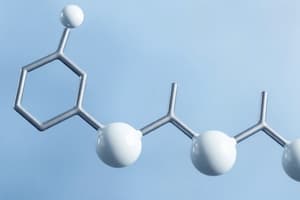Podcast
Questions and Answers
What is the defining characteristic of organic compounds?
What is the defining characteristic of organic compounds?
- They can form inorganic structures
- They contain carbon and hydrogen atoms (correct)
- They contain only carbon atoms
- They are always liquid at room temperature
Which of the following is an organic compound?
Which of the following is an organic compound?
- Sodium chloride (NaCl)
- Methane (CH4) (correct)
- Water (H2O)
- Oxygen gas (O2)
Why is carbon considered the most versatile element in organic chemistry?
Why is carbon considered the most versatile element in organic chemistry?
- It has a fixed valency of 2
- It can form long chains, rings, and branched structures (correct)
- It can only form single bonds with other atoms
- It bonds with up to eight other atoms
Which statement best describes the role of carbon in organic compounds?
Which statement best describes the role of carbon in organic compounds?
What is a unique property of organic compounds that distinguishes them from inorganic compounds?
What is a unique property of organic compounds that distinguishes them from inorganic compounds?
What type of reactions involve the addition of a reagent to an organic compound, forming a bond between the carbon and the reagent?
What type of reactions involve the addition of a reagent to an organic compound, forming a bond between the carbon and the reagent?
Which type of functional group is present in fatty acids, the essential components of cell membranes?
Which type of functional group is present in fatty acids, the essential components of cell membranes?
What allows carbon to form covalent bonds with other non-metals, enabling the formation of inorganic compounds like carbon dioxide?
What allows carbon to form covalent bonds with other non-metals, enabling the formation of inorganic compounds like carbon dioxide?
Which type of reaction involves the removal of a group from an organic compound?
Which type of reaction involves the removal of a group from an organic compound?
What role do metal catalysts play in organic chemistry reactions?
What role do metal catalysts play in organic chemistry reactions?
Study Notes
Exploring Chemistry: Organic Compounds and Carbon's Role
Carbon, a versatile and essential element, forms the backbone of organic chemistry, a branch of chemistry that studies the properties and reactions of carbon-based compounds. Let's dive into this fascinating realm and uncover the intricacies of organic chemistry and the role of carbon in it.
Organic Compounds
Organic compounds are all substances containing carbon, along with hydrogen, oxygen, nitrogen, and other elements like chlorine, sulfur, or phosphorus. The carbon atom can bond with up to four other atoms, enabling its connection to a diverse array of elements, leading to a staggering number of organic compounds. For instance, methane (CH₄), ethane (C₂H₆), and glucose (C₆H₁₂O₆) are all organic compounds.
Organic compounds hold a unique position in chemistry due to their ability to self-assemble and form complex structures, such as proteins, DNA, and carbohydrates—all essential for life. These compounds also serve as the basis for materials science, medicine, and energy production.
Carbon: The Building Block of Life
Carbon's diverse bonding characteristics make it the most versatile element in organic chemistry. It can form single, double, or triple bonds with other carbon atoms, enabling the creation of long chains, rings, and branched structures. Moreover, carbon can bond with other non-carbon elements, forming functional groups and conferring unique properties to organic compounds.
The ability to form long chains, along with the presence of functional groups, allows organic compounds to assume an incredible variety of shapes and sizes, leading to unique properties and reactions. For instance, fatty acids, essential components of cell membranes, are long, straight chains of carbon atoms connected to a carboxylic acid functional group.
Carbon's dual nature as a non-metal and a hydrogen-rich element also contributes to its unique role in chemistry. Carbon's ability to form covalent bonds with other non-metals enables the formation of inorganic compounds, like carbon dioxide (CO₂). Conversely, its ability to bond with hydrogen creates hydrocarbons, the primary building blocks of organic chemistry.
Reactions in Organic Chemistry
Organic compounds undergo various reactions, some of which include:
-
Substitution reactions: These reactions involve the replacement of one functional group with another. For example, halogenation—the addition of halogen atoms to an organic compound—is a common substitution reaction.
-
Addition reactions: These reactions involve the addition of a reagent to an organic compound, forming a bond between the carbon and the reagent. For example, the addition of hydrogen to an alkene forms an alcohol.
-
Elimination reactions: These reactions involve the removal of a group from an organic compound, typically in the form of a product. For example, the E2 elimination of a hydrogen halide from an alkyl halide forms an alkene.
-
Redox reactions: These reactions involve the transfer of electrons between organic compounds and other species, resulting in the oxidation or reduction of the organic compound. For example, the oxidation of glucose to carbon dioxide and water releases a considerable amount of energy.
-
Reactions with metal catalysts: Organic compounds can undergo reactions with metal catalysts, which speed up the rate of reaction without being consumed in the process. For example, the Ziegler-Natta catalyst is used to polymerize ethylene, forming polyethylene.
The Future of Organic Chemistry
Organic chemistry continues to play a crucial role in addressing global challenges and improving our daily lives. In medicine, organic compounds serve as the basis for drugs, antibiotics, and other therapeutic agents. In materials science, organic compounds are used to create new polymers with tailored properties, such as lightweight, flexible materials, and high-performance materials for aerospace applications.
Moreover, the field of green chemistry strives to develop more sustainable and environmentally friendly organic compounds and processes. For example, biodegradable plastics, developed from renewable resources, show promise in reducing the environmental impact of plastic waste.
By understanding the key concepts of organic chemistry and the role of carbon, we can continue to innovate and create compounds that benefit humanity and the planet.
Studying That Suits You
Use AI to generate personalized quizzes and flashcards to suit your learning preferences.
Description
Dive into the realm of organic chemistry and uncover the intricacies of carbon's role in forming organic compounds. Explore the diverse bonding characteristics of carbon and the various reactions that organic compounds undergo. Discover how organic chemistry continues to shape fields like medicine, materials science, and green chemistry.




